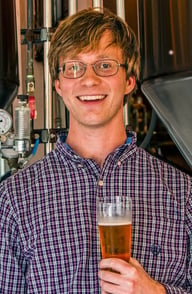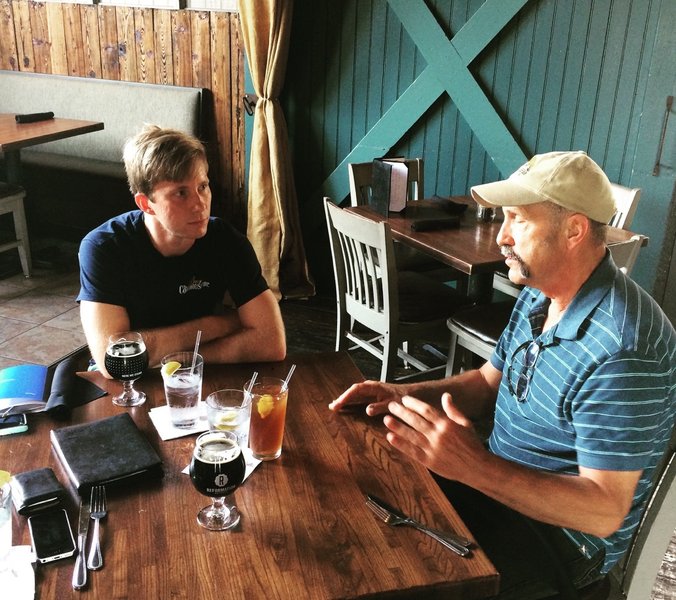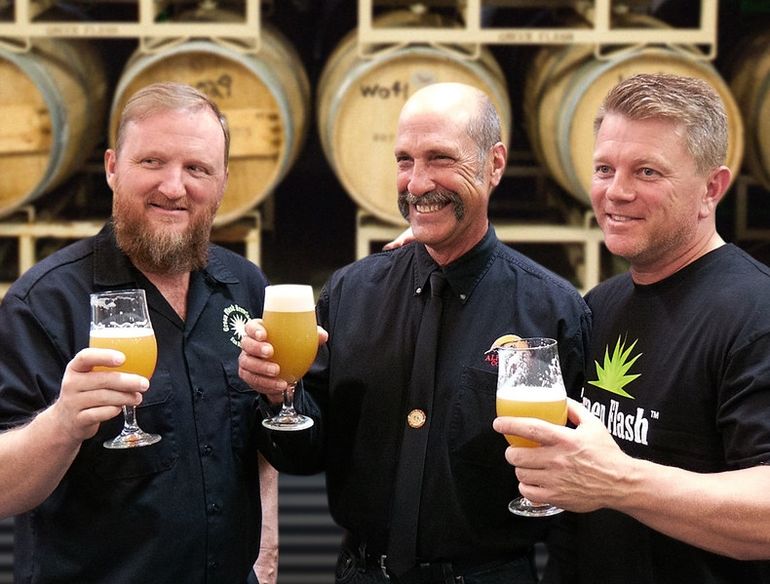Start 14-Day Trial Subscription
*No credit card required

Pursuing Hoppiness at Alpine Beer
One way or another, founder and owner of Alpine Beer Company Pat McIlhenney has spent most of his life fighting flames.
Retiring a captain after more than 30 years of firefighting, he now focuses on the raging firestorm of public protest surrounding his beers. Nobody, it seems, can get enough. Since creating Alpine Beer Company in 1999, McIlhenney and his small team of brewers have been waging a constant battle to meet demand.
The first skirmishes in his personal war to quench the public’s thirst began long ago. “I started homebrewing in ’83, with the intent to go pro,” McIlhenney told BC. “I did my homework.”
In his downtime, McIlhenney also worked in a homebrew shop and attended brew school at University of California, Davis, allowing him to “bank” a knowledge of hops, which he then applied to his beermaking, along with rigorous trial and error testing and competition entries.
McIlhenney’s professional brewing career began at Alesmith, where he had volunteered for years when not firefighting. “Eventually I told them ‘I want to start making beer’,” he said. After his years of free labor, they were glad to let him to use their equipment. “The only impact was they had to accept a check.”
He began with McIlhenney’s Irish Red, a balanced, creamy brew made with 13 malts that he had been perfecting for decades.
By 2002, he was ready to open his own brewpub in Alpine with around eight award-winning beers. The demand only grew.
“Imagine someone poking you for five years straight,” he said. “It’s irritating.” McIlhenney desperately needed backup, but didn’t want to rush into anything at the expense of quality.
Fast-forward to 2009, and he was finalizing plans with Cold Spring Brewing to contract out production. Things were looking good – the two companies had a great working relationship and the area had an almost identical water profile. However, a last minute personnel change and revised terms on Cold Spring’s end of the deal led to McIlhenney walking away.
In 2010, the company opened a perennially packed 38-seat brewpub adjacent to their brewing facility. The wait for aid continued, as did Alpine’s popularity, until out of the blue came an email from Green Flash CEO Mike Hinkley inquiring about a handshake contract deal. Their philosophies clicked. “There was a co-operative, friendly attitude [between the companies] from day one,” McIlhenney said.
By 2013, the two companies struck a deal for Green Flash to assist in brewing, packaging and distributing with nothing more than a handshake. Some might call that risky, but to McIlhenney, it was nothing but a relief. “Honest businessman have no worries about that.”
While this is undoubtedly a venture grounded in business, there is a mutual sense of respect and excitement between the companies that one might not find in other recent mergers.
Green Flash spent more than $1 million and countless hours with Alpine ensuring it had the necessary equipment to replicate and scale up recipes, which are “way more difficult to produce on a larger system,” according to McIlhenney.
For both companies, time and money are merely a means to an end of producing quality beers.
Currently, Green Flash will assist with the production of six Alpine offerings – Hoppy Birthday, Duet, and Nelson, Alpine Ale, McIlhenney's Irish Red and Captain Stout. I had the chance to try the first three.
Hoppy Birthday is a juicy, fragrantly hopped pale ale with tropical fruit notes delicately balanced by lightly sweet biscuit malt and a gently curbed bitterness in the finish. It was, of course, brewed for someone’s birthday.
Duet is a reference to the “harmonious” balance of Simcoe and Amarillo hops present in the beer, which provide maximal aroma with minimal bitterness.
Lastly, Nelson is a showcase for New Zealand’s Nelson Sauvin hop. McIlhenney first discovered the island’s “distinct terroir” on his 25th Anniversary, when he stumbled upon a field of hops. After some research and befriending hop growers, he began sourcing Nelson Sauvin. According to McIlhenney, the uniquely spicy and earthy flavors the hop imparts come from the “botanically advanced” island’s volcanic soil.
The flavors of McIlhenney’s beers are ordered and measured in a manner that can only come with a lifetime of studying brewing and continuous emphasis on quality over monetary gain. “The hard way doesn’t scare us away. Making good beer is most important,” he said. “After that, everything else falls into place.”
The companies are testing the beers in various markets across the U.S., and Alpine has just opened a brand new, significantly larger brewpub, with, unlike the old facility, indoor bathrooms.
Like firefighters, brewers can be lionized, but McIlhenney remains modest. “Both fields are very rewarding, but you’re only as good as your last contribution. I’ve had a blessed life.”



